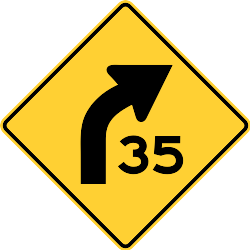Avoid passing other vehicles, including motorcycles and bicycles, on two-lane roads; it is dangerous. Do not pull out to pass unless you know you have enough space to pull back into your lane. You must judge whether or not you have enough room to pass whenever you approach an oncoming vehicle, a hill or a curve, an intersection or a road obstruction.
YIELD. Slow down and give vehicles crossing your path the right-of-way. If the way is clear, you may move forward slowly without stopping. Yield signs are usually placed where auxiliary roads lead into major roads.
A motorist should never stop his/her vehicle on railroad tracks. If a vehicle stalls on the tracks, and the motorist sees a train coming, he/she should get out and walk clear of the tracks. Never try to race a train. Most trains need more than a mile to stop, if traveling at 60 mph or more.
A diamond-shaped sign on a truck means that the load on the truck is potentially dangerous (gas, explosives, etc.). Police department and fire department officers know what to do if the load is accidentally spilled. Vehicles which display these signs are required to stop before crossing railroad tracks
If a vehicle’s conventional disc and drum brakes suddenly fail, a motorist should shift to a lower gear and pump the brake pedal fast and hard several times. If that does not work, the parking brake should be used while holding the brake release, so the motorist can let up if the rear wheels lock and the vehicle begins to skid. With the vehicle in low gear, the motorist should begin looking for a safe place to stop off the roadway and call for help.
On curves, there is a strong outward pull on your vehicle, which is especially dangerous when the road is slippery. Slow down before you enter the curve; you do not know what may be ahead (stalled car, collision, etc.).
A diamond-shaped sign on a truck means that the load on the truck is potentially dangerous (gas, explosives, etc.). Police department and fire department officers know what to do if the load is accidentally spilled. Vehicles which display these signs are required to stop before crossing railroad tracks.
Advertisement
When parking on a hill you must make sure your car does not roll into traffic if the brakes do not hold. If you park where there is a curb facing downhill, turn your wheels toward the curb and shift into reverse gear or PARK. If there are no curbs, turn your wheels toward the edge of the road, whether facing uphill or downhill.
The use of any drug (the law does not distinguish between prescription, over-the-counter, or illegal drugs) which impairs your ability to drive safely is illegal. Check with your physician or pharmacist and read the warning label if you are not sure that taking the medication will affect your driving.

This sign alerts you to an upcoming right-hand curve and provides a suggested speed for it. The arrow's direction as well as the suggested speed range are both flexible.
You MUST continue moving in the same direction after seeing this sign. This is a no-turn zone.
If a car is left in this area, which is not designated for parking, it will be hauled away at the owner's expense.
You may now pass a vehicle moving too slowly when you notice this sign as long as it is safe to do so.
You are in an area where lane changes are not permitted. Till you are told otherwise, remain where you are.
Advertisement
This is the top speed permitted beyond the sign's position.
If the light is flashing, you must stop your car completely behind the location that the sign designates.